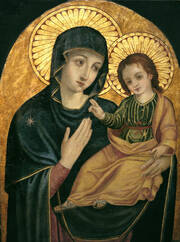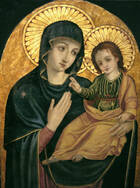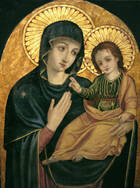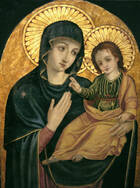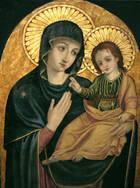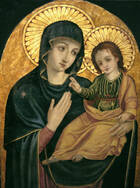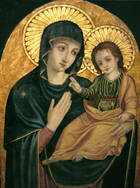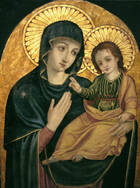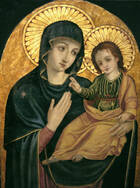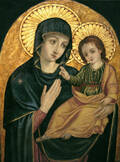Novena to Mary, Mother of God
With quotes from Pope Benedict XVI's encyclical Deus Caritas Est (God is Love), which Papa Benedetto gave to the Church on Christmas Day 2005.
The daily prayer is taken from the very end of the encyclical:
Holy Mary, Mother of God,
you have given the world its true light,
Jesus, your Son – the Son of God.
You abandoned yourself completely to God's call and thus became a wellspring of the goodness which flows forth from him.
Show us Jesus. Lead us to him.
Teach us to know and love him,
so that we too can become capable of true love
and be fountains of living water in the midst of a thirsting world.
The music is by Benedict Nichols from his Broken Key Project.
You can subscribe Totus2us's Novenas podcast on Spotify, here on iTunes or on the RSS feed. To download the free mp3 audio recordings individually, double/right click on the play buttons. This painting of Maria, Madre della Consolazione, was restored in 2010 by Marianna Fonzo & Jan Michelini in Sta Maria della Scala, Rome.
You can pray this novena at any time but it was recorded especially to prepare our hearts for Christmas 2010.
Day 1 of Totus2us's Novena, God is Love 
1. “God is love, and he who abides in love abides in God, and God abides in him” (1 Jn4:16). These words from the First Letter of John express with remarkable clarity the heart of the Christian faith: the Christian image of God and the resulting image of mankind and its destiny. In the same verse, Saint John also offers a kind of summary of the Christian life: “We have come to know and to believe in the love God has for us”.
We have come to believe in God's love: in these words the Christian can express the fundamental decision of his life. Being Christian is not the result of an ethical choice or a lofty idea, but the encounter with an event, a person, which gives life a new horizon and a decisive direction. Saint John's Gospel describes that event in these words: “God so loved the world that he gave his only Son, that whoever believes in him should ... have eternal life” (3:16). In acknowledging the centrality of love, Christian faith has retained the core of Israel's faith, while at the same time giving it new depth and breadth. The pious Jew prayed daily the words of the Book of Deuteronomy which expressed the heart of his existence: “Hear, O Israel: the Lord our God is one Lord, and you shall love the Lord your God with all your heart, and with all your soul and with all your might” (6:4-5). Jesus united into a single precept this commandment of love for God and the commandment of love for neighbour found in the Book of Leviticus: “You shall love your neighbour as yourself” (19:18). Since God has first loved us, love is now no longer a mere “command”; it is the response to the gift of love with which God draws near to us.
..5.. There is a certain relationship between love and the Divine: love promises infinity, eternity - a reality far greater and totally other than our everyday existence. Yet we have also seen that the way to attain this goal is not simply by submitting to instinct. Purification and growth in maturity are called for; and these also pass through the path of renunciation. Far from rejecting or “poisoning” eros, they heal it and restore its true grandeur.
This is due first and foremost to the fact that man is a being made up of body and soul. Man is truly himself when his body and soul are intimately united; the challenge of eros can be said to be truly overcome when this unification is achieved. Should he aspire to be pure spirit and to reject the flesh as pertaining to his animal nature alone, then spirit and body would both lose their dignity. On the other hand, should he deny the spirit and consider matter, the body, as the only reality, he would likewise lose his greatness.. ..Yet it is neither the spirit alone nor the body alone that loves: it is man, the person, a unified creature composed of body and soul, who loves. Only when both dimensions are truly united, does man attain his full stature. Only thus is love - eros - able to mature and attain its authentic grandeur."
Day 2 of Totus2us's Novena, God is Love 
6. ..What does this path of ascent and purification entail? How might love be experienced so that it can fully realize its human and divine promise? Here we can find a first, important indication in the Song of Songs, an Old Testament book well known to the mystics. According to the interpretation generally held today, the poems contained in this book were originally love-songs, perhaps intended for a Jewish wedding feast and meant to exalt conjugal love. In this context it is highly instructive to note that in the course of the book two different Hebrew words are used to indicate “love”. First there is the word dodim, a plural form suggesting a love that is still insecure, indeterminate and searching. This comes to be replaced by the word ahabà, which the Greek version of the Old Testament translates with the similar-sounding agape, which, as we have seen, becomes the typical expression for the biblical notion of love. By contrast with an indeterminate, “searching” love, this word expresses the experience of a love which involves a real discovery of the other, moving beyond the selfish character that prevailed earlier. Love now becomes concern and care for the other. No longer is it self-seeking, a sinking in the intoxication of happiness; instead it seeks the good of the beloved: it becomes renunciation and it is ready, and even willing, for sacrifice.
It is part of love's growth towards higher levels and inward purification that it now seeks to become definitive, and it does so in a twofold sense: both in the sense of exclusivity (this particular person alone) and in the sense of being “for ever”. Love embraces the whole of existence in each of its dimensions, including the dimension of time. It could hardly be otherwise, since its promise looks towards its definitive goal: love looks to the eternal. Love is indeed “ecstasy”, not in the sense of a moment of intoxication, but rather as a journey, an ongoing exodus out of the closed inward-looking self towards its liberation through self-giving, and thus towards authentic self-discovery and indeed the discovery of God: “Whoever seeks to gain his life will lose it, but whoever loses his life will preserve it” (Lk 17:33), as Jesus says throughout the Gospels. In these words, Jesus portrays his own path, which leads through the Cross to the Resurrection: the path of the grain of wheat that falls to the ground and dies, and in this way bears much fruit. Starting from the depths of his own sacrifice and of the love that reaches fulfilment therein, he also portrays in these words the essence of love and indeed of human life itself.
7 .. Eros and agape — ascending love and descending love — can never be completely separated. The more the two, in their different aspects, find a proper unity in the one reality of love, the more the true nature of love in general is realized. Even if eros is at first mainly covetous and ascending, a fascination for the great promise of happiness, in drawing near to the other, it is less and less concerned with itself, increasingly seeks the happiness of the other, is concerned more and more with the beloved, bestows itself and wants to “be there for” the other. The element of agape thus enters into this love, for otherwise eros is impoverished and even loses its own nature. On the other hand, man cannot live by oblative, descending love alone. He cannot always give, he must also receive. Anyone who wishes to give love must also receive love as a gift. Certainly, as the Lord tells us, one can become a source from which rivers of living water flow. Yet to become such a source, one must constantly drink anew from the original source, which is Jesus Christ, from whose pierced heart flows the love of God.
In the account of Jacob's ladder, the Fathers of the Church saw this inseparable connection between ascending and descending love, between eros which seeks God and agape which passes on the gift received, symbolized in various ways. In that biblical passage we read how the Patriarch Jacob saw in a dream, above the stone which was his pillow, a ladder reaching up to heaven, on which the angels of God were ascending and descending. A particularly striking interpretation of this vision is presented by Pope Gregory the Great in his Pastoral Rule. He tells us that the good pastor must be rooted in contemplation. Only in this way will he be able to take upon himself the needs of others and make them his own.
Day 3 of Totus2us's Novena, God is Love 
9. The world of the Bible presents us with a new image of God. In surrounding cultures, the image of God and of the gods ultimately remained unclear and contradictory. In the development of biblical faith, however, the content of the prayer fundamental to Israel, the Shema, became increasingly clear and unequivocal: “Hear, O Israel, the Lord our God is one Lord” (Dt 6:4). There is only one God, the Creator of heaven and earth, who is thus the God of all. Two facts are significant about this statement: all other gods are not God, and the universe in which we live has its source in God and was created by him. Certainly, the notion of creation is found elsewhere, yet only here does it become absolutely clear that it is not one god among many, but the one true God himself who is the source of all that exists; the whole world comes into existence by the power of his creative Word. Consequently, his creation is dear to him, for it was willed by him and “made” by him. The second important element now emerges: this God loves man. The divine power that Aristotle at the height of Greek philosophy sought to grasp through reflection, is indeed for every being an object of desire and of love — and as the object of love this divinity moves the world — but in itself it lacks nothing and does not love: it is solely the object of love. The one God in whom Israel believes, on the other hand, loves with a personal love. His love, moreover, is an elective love: among all the nations he chooses Israel and loves her — but he does so precisely with a view to healing the whole human race. God loves, and his love may certainly be called eros, yet it is also totally agape.
The Prophets, particularly Hosea and Ezekiel, described God's passion for his people using boldly erotic images. God's relationship with Israel is described using the metaphors of betrothal and marriage; idolatry is thus adultery and prostitution. Here we find a specific reference — as we have seen — to the fertility cults and their abuse of eros, but also a description of the relationship of fidelity between Israel and her God. The history of the love-relationship between God and Israel consists, at the deepest level, in the fact that he gives her the Torah, thereby opening Israel's eyes to man's true nature and showing her the path leading to true humanism. It consists in the fact that man, through a life of fidelity to the one God, comes to experience himself as loved by God, and discovers joy in truth and in righteousness — a joy in God which becomes his essential happiness: “Whom do I have in heaven but you? And there is nothing upon earth that I desire besides you ... for me it is good to be near God” (Ps 73 [72]:25, 28).
10. We have seen that God's eros for man is also totally agape. This is not only because it is bestowed in a completely gratuitous manner, without any previous merit, but also because it is love which forgives. Hosea above all shows us that this agape dimension of God's love for man goes far beyond the aspect of gratuity. Israel has committed “adultery” and has broken the covenant; God should judge and repudiate her. It is precisely at this point that God is revealed to be God and not man: “How can I give you up, O Ephraim! How can I hand you over, O Israel! ... My heart recoils within me, my compassion grows warm and tender. I will not execute my fierce anger, I will not again destroy Ephraim; for I am God and not man, the Holy One in your midst” (Hos 11:8-9). God's passionate love for his people — for humanity — is at the same time a forgiving love. It is so great that it turns God against himself, his love against his justice. Here Christians can see a dim prefigurement of the mystery of the Cross: so great is God's love for man that by becoming man he follows him even into death, and so reconciles justice and love. The philosophical dimension to be noted in this biblical vision, and its importance from the standpoint of the history of religions, lies in the fact that on the one hand we find ourselves before a strictly metaphysical image of God: God is the absolute and ultimate source of all being; but this universal principle of creation — the Logos, primordial reason — is at the same time a lover with all the passion of a true love. Eros is thus supremely ennobled, yet at the same time it is so purified as to become one with agape. We can thus see how the reception of the Song of Songs in the canon of sacred Scripture was soon explained by the idea that these love songs ultimately describe God's relation to man and man's relation to God. Thus the Song of Songs became, both in Christian and Jewish literature, a source of mystical knowledge and experience, an expression of the essence of biblical faith: that man can indeed enter into union with God — his primordial aspiration. But this union is no mere fusion, a sinking in the nameless ocean of the Divine; it is a unity which creates love, a unity in which both God and man remain themselves and yet become fully one. As Saint Paul says: “He who is united to the Lord becomes one spirit with him” (1 Cor 6:17).
Day 4 of Totus2us's Novena, God is Love 
12 ... The real novelty of the New Testament lies not so much in new ideas as in the figure of Christ himself, who gives flesh and blood to those concepts — an unprecedented realism. In the Old Testament, the novelty of the Bible did not consist merely in abstract notions but in God's unpredictable and in some sense unprecedented activity. This divine activity now takes on dramatic form when, in Jesus Christ, it is God himself who goes in search of the “stray sheep”, a suffering and lost humanity. When Jesus speaks in his parables of the shepherd who goes after the lost sheep, of the woman who looks for the lost coin, of the father who goes to meet and embrace his prodigal son, these are no mere words: they constitute an explanation of his very being and activity. His death on the Cross is the culmination of that turning of God against himself in which he gives himself in order to raise man up and save him. This is love in its most radical form. By contemplating the pierced side of Christ, we can understand the starting-point of this Encyclical Letter: “God is love” (1 Jn 4:8). It is there that this truth can be contemplated. It is from there that our definition of love must begin. In this contemplation the Christian discovers the path along which his life and love must move.
13. Jesus gave this act of oblation an enduring presence through his institution of the Eucharist at the Last Supper. He anticipated his death and resurrection by giving his disciples, in the bread and wine, his very self, his body and blood as the new manna. The ancient world had dimly perceived that man's real food — what truly nourishes him as man — is ultimately the Logos, eternal wisdom: this same Logos now truly becomes food for us — as love. The Eucharist draws us into Jesus' act of self-oblation. More than just statically receiving the incarnate Logos, we enter into the very dynamic of his self-giving. The imagery of marriage between God and Israel is now realized in a way previously inconceivable: it had meant standing in God's presence, but now it becomes union with God through sharing in Jesus' self-gift, sharing in his body and blood. The sacramental “mysticism”, grounded in God's condescension towards us, operates at a radically different level and lifts us to far greater heights than anything that any human mystical elevation could ever accomplish.
14. Here we need to consider yet another aspect: this sacramental “mysticism” is social in character, for in sacramental communion I become one with the Lord, like all the other communicants. As Saint Paul says, “Because there is one bread, we who are many are one body, for we all partake of the one bread” (1 Cor 10:17). Union with Christ is also union with all those to whom he gives himself. I cannot possess Christ just for myself; I can belong to him only in union with all those who have become, or who will become, his own. Communion draws me out of myself towards him, and thus also towards unity with all Christians. We become “one body”, completely joined in a single existence. Love of God and love of neighbour are now truly united: God incarnate draws us all to himself. We can thus understand how agape also became a term for the Eucharist: there God's own agape comes to us bodily, in order to continue his work in us and through us. Only by keeping in mind this Christological and sacramental basis can we correctly understand Jesus' teaching on love. The transition which he makes from the Law and the Prophets to the twofold commandment of love of God and of neighbour, and his grounding the whole life of faith on this central precept, is not simply a matter of morality — something that could exist apart from and alongside faith in Christ and its sacramental re-actualization. Faith, worship and ethos are interwoven as a single reality which takes shape in our encounter with God's agape. Here the usual contraposition between worship and ethics simply falls apart. “Worship” itself, Eucharistic communion, includes the reality both of being loved and of loving others in turn. A Eucharist which does not pass over into the concrete practice of love is intrinsically fragmented. Conversely, as we shall have to consider in greater detail below, the “commandment” of love is only possible because it is more than a requirement. Love can be “commanded” because it has first been given.
15. This principle is the starting-point for understanding the great parables of Jesus. The rich man begs from his place of torment that his brothers be informed about what happens to those who simply ignore the poor man in need. Jesus takes up this cry for help as a warning to help us return to the right path. The parable of the Good Samaritan offers two particularly important clarifications. Until that time, the concept of “neighbour” was understood as referring essentially to one's countrymen and to foreigners who had settled in the land of Israel; in other words, to the closely-knit community of a single country or people. This limit is now abolished. Anyone who needs me, and whom I can help, is my neighbour. The concept of “neighbour” is now universalized, yet it remains concrete. Despite being extended to all mankind, it is not reduced to a generic, abstract and undemanding expression of love, but calls for my own practical commitment here and now. The Church has the duty to interpret ever anew this relationship between near and far with regard to the actual daily life of her members. Lastly, we should especially mention the great parable of the Last Judgement, in which love becomes the criterion for the definitive decision about a human life's worth or lack thereof. Jesus identifies himself with those in need, with the hungry, the thirsty, the stranger, the naked, the sick and those in prison. “As you did it to one of the least of these my brethren, you did it to me” (Mt 25:40). Love of God and love of neighbour have become one: in the least of the brethren we find Jesus himself, and in Jesus we find God.
Day 5 of Totus2us's Novena, God is Love 
16. Having reflected on the nature of love and its meaning in biblical faith, we are left with two questions concerning our own attitude: can we love God without seeing him? And can love be commanded? Against the double commandment of love these questions raise a double objection. No one has ever seen God, so how could we love him? Moreover, love cannot be commanded; it is ultimately a feeling that is either there or not, nor can it be produced by the will. Scripture seems to reinforce the first objection when it states: “If anyone says, ‘I love God,' and hates his brother, he is a liar; for he who does not love his brother whom he has seen, cannot love God whom he has not seen” (1 Jn 4:20). But this text hardly excludes the love of God as something impossible. On the contrary, the whole context of the passage quoted from the First Letter of John shows that such love is explicitly demanded. The unbreakable bond between love of God and love of neighbour is emphasized. One is so closely connected to the other that to say that we love God becomes a lie if we are closed to our neighbour or hate him altogether. Saint John's words should rather be interpreted to mean that love of neighbour is a path that leads to the encounter with God, and that closing our eyes to our neighbour also blinds us to God.
17. True, no one has ever seen God as he is. And yet God is not totally invisible to us; he does not remain completely inaccessible. God loved us first, says the Letter of John quoted above, and this love of God has appeared in our midst. He has become visible in as much as he “has sent his only Son into the world, so that we might live through him” (1 Jn 4:9). God has made himself visible: in Jesus we are able to see the Father. Indeed, God is visible in a number of ways. In the love-story recounted by the Bible, he comes towards us, he seeks to win our hearts, all the way to the Last Supper, to the piercing of his heart on the Cross, to his appearances after the Resurrection and to the great deeds by which, through the activity of the Apostles, he guided the nascent Church along its path. Nor has the Lord been absent from subsequent Church history: he encounters us ever anew, in the men and women who reflect his presence, in his word, in the sacraments, and especially in the Eucharist. In the Church's Liturgy, in her prayer, in the living community of believers, we experience the love of God, we perceive his presence and we thus learn to recognize that presence in our daily lives. He has loved us first and he continues to do so; we too, then, can respond with love. God does not demand of us a feeling which we ourselves are incapable of producing. He loves us, he makes us see and experience his love, and since he has “loved us first”, love can also blossom as a response within us.
In the gradual unfolding of this encounter, it is clearly revealed that love is not merely a sentiment. Sentiments come and go. A sentiment can be a marvellous first spark, but it is not the fullness of love. Earlier we spoke of the process of purification and maturation by which eros comes fully into its own, becomes love in the full meaning of the word. It is characteristic of mature love that it calls into play all man's potentialities; it engages the whole man, so to speak. Contact with the visible manifestations of God's love can awaken within us a feeling of joy born of the experience of being loved. But this encounter also engages our will and our intellect. Acknowledgment of the living God is one path towards love, and the “yes” of our will to his will unites our intellect, will and sentiments in the all- embracing act of love. But this process is always open-ended; love is never “finished” and complete; throughout life, it changes and matures, and thus remains faithful to itself. Idem velle atque idem nolle — to want the same thing, and to reject the same thing — was recognized by antiquity as the authentic content of love: the one becomes similar to the other, and this leads to a community of will and thought. The love-story between God and man consists in the very fact that this communion of will increases in a communion of thought and sentiment, and thus our will and God's will increasingly coincide: God's will is no longer for me an alien will, something imposed on me from without by the commandments, but it is now my own will, based on the realization that God is in fact more deeply present to me than I am to myself. Then self- abandonment to God increases and God becomes our joy.
18. Love of neighbour is thus shown to be possible in the way proclaimed by the Bible, by Jesus. It consists in the very fact that, in God and with God, I love even the person whom I do not like or even know. This can only take place on the basis of an intimate encounter with God, an encounter which has become a communion of will, even affecting my feelings. Then I learn to look on this other person not simply with my eyes and my feelings, but from the perspective of Jesus Christ. His friend is my friend. Going beyond exterior appearances, I perceive in others an interior desire for a sign of love, of concern. This I can offer them not only through the organizations intended for such purposes, accepting it perhaps as a political necessity. Seeing with the eyes of Christ, I can give to others much more than their outward necessities; I can give them the look of love which they crave. Here we see the necessary interplay between love of God and love of neighbour which the First Letter of John speaks of with such insistence. If I have no contact whatsoever with God in my life, then I cannot see in the other anything more than the other, and I am incapable of seeing in him the image of God. But if in my life I fail completely to heed others, solely out of a desire to be “devout” and to perform my “religious duties”, then my relationship with God will also grow arid. It becomes merely “proper”, but loveless. Only my readiness to encounter my neighbour and to show him love makes me sensitive to God as well. Only if I serve my neighbour can my eyes be opened to what God does for me and how much he loves me. The saints — consider the example of Blessed Teresa of Calcutta — constantly renewed their capacity for love of neighbour from their encounter with the Eucharistic Lord, and conversely this encounter acquired its real- ism and depth in their service to others. Love of God and love of neighbour are thus inseparable, they form a single commandment. But both live from the love of God who has loved us first. No longer is it a question, then, of a “commandment” imposed from without and calling for the impossible, but rather of a freely-bestowed experience of love from within, a love which by its very nature must then be shared with others. Love grows through love. Love is “divine” because it comes from God and unites us to God; through this unifying process it makes us a “we” which transcends our divisions and makes us one, until in the end God is “all in all” (1 Cor 15:28).
Day 6 of Totus2us's Novena, God is Love 
19. “If you see charity, you see the Trinity”, wrote Saint Augustine. In the foregoing reflections, we have been able to focus our attention on the Pierced one, recognizing the plan of the Father who, moved by love, sent his only-begotten Son into the world to redeem man. By dying on the Cross — as Saint John tells us — Jesus “gave up his Spirit” (Jn 19:30), anticipating the gift of the Holy Spirit that he would make after his Resurrection. This was to fulfil the promise of “rivers of living water” that would flow out of the hearts of believers, through the outpouring of the Spirit. The Spirit, in fact, is that interior power which harmonizes their hearts with Christ's heart and moves them to love their brethren as Christ loved them, when he bent down to wash the feet of the disciples and above all when he gave his life for us.
The Spirit is also the energy which transforms the heart of the ecclesial community, so that it becomes a witness before the world to the love of the Father, who wishes to make humanity a single family in his Son. The entire activity of the Church is an expression of a love that seeks the integral good of man: it seeks his evangelization through Word and Sacrament, an undertaking that is often heroic in the way it is acted out in history; and it seeks to promote man in the various arenas of life and human activity. Love is therefore the service that the Church carries out in order to attend constantly to man's sufferings and his needs, including material needs. ...
25 ..a) The Church's deepest nature is expressed in her three-fold responsibility: of proclaiming the word of God (kerygma-martyria), celebrating the sacraments (leitourgia), and exercising the ministry of charity (diakonia). These duties presuppose each other and are inseparable. For the Church, charity is not a kind of welfare activity which could equally well be left to others, but is a part of her nature, an indispensable expression of her very being.
b) The Church is God's family in the world. In this family no one ought to go without the necessities of life. Yet at the same time caritas-agape extends beyond the frontiers of the Church. The parable of the Good Samaritan remains as a standard which imposes universal love towards the needy whom we encounter “by chance”, whoever they may be. Without in any way detracting from this commandment of universal love, the Church also has a specific responsibility: within the ecclesial family no member should suffer through being in need. The teaching of the Letter to the Galatians is emphatic: “So then, as we have opportunity, let us do good to all, and especially to those who are of the household of faith” (6:10). ....
28 b) Love — caritas — will always prove necessary, even in the most just society. There is no ordering of the State so just that it can eliminate the need for a service of love. Whoever wants to eliminate love is preparing to eliminate man as such. There will always be suffering which cries out for consolation and help. There will always be loneliness. There will always be situations of material need where help in the form of concrete love of neighbour is indispensable. The State which would provide everything, absorbing everything into itself, would ultimately become a mere bureaucracy incapable of guaranteeing the very thing which the suffering person — every person — needs: namely, loving personal concern. We do not need a State which regulates and controls everything, but a State which, in accordance with the principle of subsidiarity, generously acknowledges and supports initiatives arising from the different social forces and combines spontaneity with closeness to those in need. The Church is one of those living forces: she is alive with the love enkindled by the Spirit of Christ. This love does not simply offer people material help, but refreshment and care for their souls, something which often is even more necessary than material support. In the end, the claim that just social structures would make works of charity superfluous masks a materialist conception of man: the mistaken notion that man can live “by bread alone” (Mt 4:4) — a conviction that demeans man and ultimately disregards all that is specifically human. ...
31 .. a) Following the example given in the parable of the Good Samaritan, Christian charity is first of all the simple response to immediate needs and specific situations: feeding the hungry, clothing the naked, caring for and healing the sick, visiting those in prison, etc. The Church's charitable organizations, beginning with those of Caritas (at diocesan, national and international levels), ought to do everything in their power to provide the resources and above all the personnel needed for this work. Individuals who care for those in need must first be professionally competent: they should be properly trained in what to do and how to do it, and committed to continuing care. Yet, while professional competence is a primary, fundamental requirement, it is not of itself sufficient. We are dealing with human beings, and human beings always need something more than technically proper care. They need humanity. They need heartfelt concern. Those who work for the Church's charitable organizations must be distinguished by the fact that they do not merely meet the needs of the moment, but they dedicate themselves to others with heartfelt concern, enabling them to experience the richness of their humanity. Consequently, in addition to their necessary professional training, these charity workers need a “formation of the heart”: they need to be led to that encounter with God in Christ which awakens their love and opens their spirits to others. As a result, love of neighbour will no longer be for them a commandment imposed, so to speak, from without, but a consequence deriving from their faith, a faith which becomes active through love.
b) Christian charitable activity must be independent of parties and ideologies. It is not a means of changing the world ideologically, and it is not at the service of worldly stratagems, but it is a way of making present here and now the love which man always needs. The modern age, particularly from the nineteenth century on, has been dominated by various versions of a philosophy of progress whose most radical form is Marxism. Part of Marxist strategy is the theory of impoverishment: in a situation of unjust power, it is claimed, anyone who engages in charitable initiatives is actually serving that unjust system, making it appear at least to some extent tolerable. This in turn slows down a potential revolution and thus blocks the struggle for a better world. Seen in this way, charity is rejected and attacked as a means of preserving the status quo. What we have here, though, is really an inhuman philosophy. People of the present are sacrificed to the moloch of the future — a future whose effective realization is at best doubtful. One does not make the world more human by refusing to act humanely here and now. We contribute to a better world only by personally doing good now, with full commitment and wherever we have the opportunity, independently of partisan strategies and programmes. The Christian's programme — the programme of the Good Samaritan, the programme of Jesus — is “a heart which sees”. This heart sees where love is needed and acts accordingly. Obviously when charitable activity is carried out by the Church as a communitarian initiative, the spontaneity of individuals must be combined with planning, foresight and cooperation with other similar institutions.
c) Charity, furthermore, cannot be used as a means of engaging in what is nowadays considered proselytism. Love is free; it is not practised as a way of achieving other ends. But this does not mean that charitable activity must somehow leave God and Christ aside. For it is always concerned with the whole man. Often the deepest cause of suffering is the very absence of God. Those who practise charity in the Church's name will never seek to impose the Church's faith upon others. They realize that a pure and generous love is the best witness to the God in whom we believe and by whom we are driven to love. A Christian knows when it is time to speak of God and when it is better to say nothing and to let love alone speak. He knows that God is love and that God's presence is felt at the very time when the only thing we do is to love. He knows — to return to the questions raised earlier — that disdain for love is disdain for God and man alike; it is an attempt to do without God. Consequently, the best defence of God and man consists precisely in love. It is the responsibility of the Church's charitable organizations to reinforce this awareness in their members, so that by their activity — as well as their words, their silence, their example — they may be credible witnesses to Christ."
Day 7 of Totus2us's Novena, God is Love 
34. Interior openness to the Catholic dimension of the Church cannot fail to dispose charity workers to work in harmony with other organizations in serving various forms of need, but in a way that respects what is distinctive about the service which Christ requested of his disciples. Saint Paul, in his hymn to charity, teaches us that it is always more than activity alone: “If I give away all I have, and if I deliver my body to be burned, but do not have love, I gain nothing.” This hymn must be the Magna Carta of all ecclesial service; it sums up all the reflections on love which I have offered throughout this encyclical letter. Practical activity will always be insufficient, unless it visibly expresses a love for man, a love nourished by an encounter with Christ. My deep personal sharing in the needs and sufferings of others becomes a sharing of my very self with them: if my gift is not to prove a source of humiliation, I must give to others not only something that is my own, but my very self; I must be personally present in my gift.
35. This proper way of serving others also leads to humility. The one who serves does not consider himself superior to the one served, however miserable his situation at the moment may be. Christ took the lowest place in the world — the Cross — and by this radical humility he redeemed us and constantly comes to our aid. Those who are in a position to help others will realize that in doing so they themselves receive help; being able to help others is no merit or achievement of their own. This duty is a grace. The more we do for others, the more we understand and can appropriate the words of Christ: “We are useless servants” (Lk 17:10). We recognize that we are not acting on the basis of any superiority or greater personal efficiency, but because the Lord has graciously enabled us to do so. There are times when the burden of need and our own limitations might tempt us to become discouraged. But precisely then we are helped by the knowledge that, in the end, we are only instruments in the Lord's hands; and this knowledge frees us from the presumption of thinking that we alone are personally responsible for building a better world. In all humility we will do what we can, and in all humility we will entrust the rest to the Lord. It is God who governs the world, not we. We offer him our service only to the extent that we can, and for as long as he grants us the strength. To do all we can with what strength we have, however, is the task which keeps the good servant of Jesus Christ always at work: “The love of Christ urges us on” (2 Cor 5:14).
36. When we consider the immensity of others' needs, we can, on the one hand, be driven towards an ideology that would aim at doing what God's governance of the world apparently cannot: fully resolving every problem. Or we can be tempted to give in to inertia, since it would seem that in any event nothing can be accomplished. At such times, a living relationship with Christ is decisive if we are to keep on the right path, without falling into an arrogant contempt for man, something not only unconstructive but actually destructive, or surrendering to a resignation which would prevent us from being guided by love in the service of others. Prayer, as a means of drawing ever new strength from Christ, is concretely and urgently needed. People who pray are not wasting their time, even though the situation appears desperate and seems to call for action alone. Piety does not undermine the struggle against the poverty of our neighbours, however extreme. In the example of Blessed Teresa of Calcutta we have a clear illustration of the fact that time devoted to God in prayer not only does not detract from effective and loving service to our neighbour but is in fact the inexhaustible source of that service. In her letter for Lent 1996, Blessed Teresa wrote to her lay co-workers: “We need this deep connection with God in our daily life. How can we obtain it? By prayer.”
Day 8 of Totus2us's Novena, God is Love 
37. It is time to reaffirm the importance of prayer in the face of the activism and the growing secularism of many Christians engaged in charitable work. Clearly, the Christian who prays does not claim to be able to change God's plans or correct what he has foreseen. Rather, he seeks an encounter with the Father of Jesus Christ, asking God to be present with the consolation of the Spirit to him and his work. A personal relationship with God and an abandonment to his will can prevent man from being demeaned and save him from falling prey to the teaching of fanaticism and terrorism. An authentically religious attitude prevents man from presuming to judge God, accusing him of allowing poverty and failing to have compassion for his creatures. When people claim to build a case against God in defence of man, on whom can they depend when human activity proves powerless?
38. Certainly Job could complain before God about the presence of incomprehensible and apparently unjustified suffering in the world. In his pain he cried out: “Oh, that I knew where I might find him, that I might come even to his seat! ... I would learn what he would answer me, and understand what he would say to me. Would he contend with me in the greatness of his power? ... Therefore I am terrified at his presence; when I consider, I am in dread of him. God has made my heart faint; the Almighty has terrified me” (23:3, 5-6, 15-16). Often we cannot understand why God refrains from intervening. Yet he does not prevent us from crying out, like Jesus on the Cross: “My God, my God, why have you forsaken me?” (Mt 27:46). We should continue asking this question in prayerful dialogue before his face: “Lord, holy and true, how long will it be?” (Rev 6:10). It is Saint Augustine who gives us faith's answer to our sufferings: “Si comprehendis, non est Deus” — ”if you understand him, he is not God.” Our protest is not meant to challenge God, or to suggest that error, weakness or indifference can be found in him. For the believer, it is impossible to imagine that God is powerless or that “perhaps he is asleep.” Instead, our crying out is, as it was for Jesus on the Cross, the deepest and most radical way of affirming our faith in his sovereign power. Even in their bewilderment and failure to understand the world around them, Christians continue to believe in the “goodness and loving kindness of God” (Tit 3:4). Immersed like everyone else in the dramatic complexity of historical events, they remain unshakably certain that God is our Father and loves us, even when his silence remains incomprehensible.
39. Faith, hope and charity go together. Hope is practised through the virtue of patience, which continues to do good even in the face of apparent failure, and through the virtue of humility, which accepts God's mystery and trusts him even at times of darkness. Faith tells us that God has given his Son for our sakes and gives us the victorious certainty that it is really true: God is love! It thus transforms our impatience and our doubts into the sure hope that God holds the world in his hands and that, as the dramatic imagery of the end of the Book of Revelation points out, in spite of all darkness he ultimately triumphs in glory. Faith, which sees the love of God revealed in the pierced heart of Jesus on the Cross, gives rise to love. Love is the light — and in the end, the only light — that can always illuminate a world grown dim and give us the courage needed to keep living and working. Love is possible, and we are able to practise it because we are created in the image of God. To experience love and in this way to cause the light of God to enter into the world — this is the invitation I would like to extend with the present encyclical.
Day 9 of Totus2us's Novena, God is Love 
40. Finally, let us consider the saints, who exercised charity in an exemplary way. Our thoughts turn especially to Martin of Tours († 397), the soldier who became a monk and a bishop: he is almost like an icon, illustrating the irreplaceable value of the individual testimony to charity. At the gates of Amiens, Martin gave half of his cloak to a poor man: Jesus himself, that night, appeared to him in a dream wearing that cloak, confirming the permanent validity of the Gospel saying: “I was naked and you clothed me ... as you did it to one of the least of these my brethren, you did it to me” (Mt 25:36, 40). Yet in the history of the Church, how many other testimonies to charity could be quoted! In particular, the entire monastic movement, from its origins with Saint Anthony the Abbot († 356), expresses an immense service of charity towards neighbour. In his encounter “face to face” with the God who is Love, the monk senses the impelling need to transform his whole life into service of neighbour, in addition to service of God. This explains the great emphasis on hospitality, refuge and care of the infirm in the vicinity of the monasteries. It also explains the immense initiatives of human welfare and Christian formation, aimed above all at the very poor, who became the object of care firstly for the monastic and mendicant orders, and later for the various male and female religious institutes all through the history of the Church. The figures of saints such as Francis of Assisi, Ignatius of Loyola, John of God, Camillus of Lellis, Vincent de Paul, Louise de Marillac, Giuseppe B. Cottolengo, John Bosco, Luigi Orione, Teresa of Calcutta to name but a few—stand out as lasting models of social charity for all people of good will. The saints are the true bearers of light within history, for they are men and women of faith, hope and love.
41. Outstanding among the saints is Mary, Mother of the Lord and mirror of all holiness. In the Gospel of Luke we find her engaged in a service of charity to her cousin Elizabeth, with whom she remained for “about three months” (1:56) so as to assist her in the final phase of her pregnancy. “Magnificat anima mea Dominum”, she says on the occasion of that visit, “My soul magnifies the Lord” (Lk 1:46). In these words she expresses her whole programme of life: not setting herself at the centre, but leaving space for God, who is encountered both in prayer and in service of neighbour — only then does goodness enter the world. Mary's greatness consists in the fact that she wants to magnify God, not herself. She is lowly: her only desire is to be the handmaid of the Lord. She knows that she will only contribute to the salvation of the world if, rather than carrying out her own projects, she places herself completely at the disposal of God's initiatives. Mary is a woman of hope: only because she believes in God's promises and awaits the salvation of Israel, can the angel visit her and call her to the decisive service of these promises. Mary is a woman of faith: “Blessed are you who believed”, Elizabeth says to her. The Magnificat —a portrait, so to speak, of her soul — is entirely woven from threads of Holy Scripture, threads drawn from the Word of God. Here we see how completely at home Mary is with the Word of God, with ease she moves in and out of it. She speaks and thinks with the Word of God; the Word of God becomes her word, and her word issues from the Word of God. Here we see how her thoughts are attuned to the thoughts of God, how her will is one with the will of God. Since Mary is completely imbued with the Word of God, she is able to become the Mother of the Word Incarnate. Finally, Mary is a woman who loves. How could it be otherwise? As a believer who in faith thinks with God's thoughts and wills with God's will, she cannot fail to be a woman who loves. We sense this in her quiet gestures, as recounted by the infancy narratives in the Gospel. We see it in the delicacy with which she recognizes the need of the spouses at Cana and makes it known to Jesus. We see it in the humility with which she recedes into the background during Jesus' public life, knowing that the Son must establish a new family and that the Mother's hour will come only with the Cross, which will be Jesus' true hour. When the disciples flee, Mary will remain beneath the Cross; later, at the hour of Pentecost, it will be they who gather around her as they wait for the Holy Spirit.
42. The lives of the saints are not limited to their earthly biographies but also include their being and working in God after death. In the saints one thing becomes clear: those who draw near to God do not withdraw from men, but rather become truly close to them. In no one do we see this more clearly than in Mary. The words addressed by the crucified Lord to his disciple — to John and through him to all disciples of Jesus: “Behold, your mother!” (Jn 19:27) — are fulfilled anew in every generation. Mary has truly become the Mother of all believers. Men and women of every time and place have recourse to her motherly kindness and her virginal purity and grace, in all their needs and aspirations, their joys and sorrows, their moments of loneliness and their common endeavours. They constantly experience the gift of her goodness and the unfailing love which she pours out from the depths of her heart. The testimonials of gratitude, offered to her from every continent and culture, are a recognition of that pure love which is not self- seeking but simply benevolent. At the same time, the devotion of the faithful shows an infallible intuition of how such love is possible: it becomes so as a result of the most intimate union with God, through which the soul is totally pervaded by him—a condition which enables those who have drunk from the fountain of God's love to become in their turn a fountain from which “flow rivers of living water” (Jn 7:38). Mary, Virgin and Mother, shows us what love is and whence it draws its origin and its constantly renewed power. To her we entrust the Church and her mission in the service of love:
Holy Mary, Mother of God,
you have given the world its true light,
Jesus, your Son – the Son of God.
You abandoned yourself completely to God's call
and thus became a wellspring
of the goodness which flows forth from him.
Show us Jesus. Lead us to him.
Teach us to know and love him,
so that we too can become capable of true love
and be fountains of living water
in the midst of a thirsting world."
Given in Rome, at Saint Peter's, on 25 December, the Solemnity of the Nativity of the Lord, in the year 2005, the first of my Pontificate.
